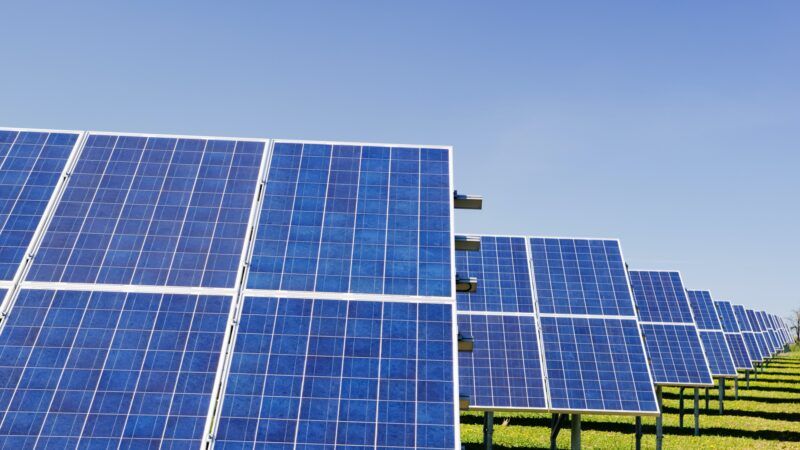Biden's Solar Panel Tariffs Make It Costlier To Meet Biden's Climate Goals
Nothing new under the sun as Biden decides to extend Trump's solar panel tariffs for four more years.

The Biden administration's plans to address climate change faces a serious obstacle: the Biden administration's protectionist trade policies.
On Friday, the White House announced that it would extend Trump-era tariffs on several types of imported solar panels and solar cells. Those tariffs were set to expire later this month, but President Joe Biden has invoked his unilateral authority to extend them for another four years.
The tariff will be applied at a rate of 14.75 percent this year, with planned declines to 14.5 percent, 14.25 percent, and 14 percent in each of the next three years. Donald Trump's tariffs had been applied at 30 percent in 2018 and declined to 15 percent last year.
In addition to the lower rate, Biden's declaration of the tariff extension makes some technical changes to limit the scope of those import duties—double-sided solar cells, known as "bifacial cells," are now exempt from tariffs, for example. But the overall goal is the same as it was under Trump: to raise the price that consumers will pay for imported solar panels and their component parts.
But the Biden administration also wants Americans to consume more solar power. In fact, that's a crucial part of Biden's plan to combat climate change. The White House has said it wants solar energy to account for half of all American energy production by 2050. The administration has already taken steps to free up more federal land for solar facilities, and a major component of Biden's "Build Back Better" plan is a new tax credit for residential solar panel installations.
The only way that will happen is with imported solar panels and solar cells. The U.S. is expected to expand solar production by about 30 gigawatts this year and 32 gigawatts in 2023, according to the trade publication Solar Power World. But domestic production can only supply about 8 gigawatts' worth of solar panels annually.
The artificially higher prices created by tariffs have already hammered America's solar industry. Abigail Ross Hopper, president of the Solar Energy Industries Association, estimated last year that "America lost out on 62,000 solar jobs, including a net-loss of 6,000 solar manufacturing jobs," due to the impact of tariffs. After Biden's announcement on Friday, Hopper said in a statement that she was "disappointed" about the decision to extend the tariffs, though she applauded the decision to exempt two-sided cells.
Meanwhile, the higher prices created by tariffs are passed along the supply chain. According to a study by the American Action Forum, solar panel consumers in the U.S. paid an extra $1.3 billion from 2018 to 2020 because of the added costs created by tariffs. The tariffs also likely contribute to the fact that American solar consumers pay roughly twice as much per watt of energy produced than the average consumer in the rest of the world.
Tariffs mean higher prices, and higher prices mean less consumption. This is just basic economics.
The administration wants to force consumers to pay higher prices to please domestic solar companies (which petitioned the White House to extend the tarrifs), then use tax dollars to offset the artificially higher prices with tax credits for consumers. All while patting themselves on the back for encouraging the expansion of green energy, no doubt. But even if the federal government can throw enough resources at individuals and businesses to reach the White House's ambitious solar goals, those would still be easier to achieve if the government wasn't also artificially hiking the price of imported solar panels.
No matter how economically nonsensical this tariff extension might be, the political aspect should be clear. These are no longer Trump's tariffs. By bypassing the planned expiration and authorizing his own extension, Biden now owns this policy.
It would be nice to see him take some heat for that. When Trump first levied these solar panel tariffs, the outcry from environmental groups was significant. The Environmental Defense Fund slammed the domestic producers who asked for the tariffs for prioritizing their bottom lines over the climate. "The planet could suffer, because every kilowatt of zero-carbon solar energy that isn't installed is a kilowatt that will likely be replaced by electricity generated by dirty, fossil fuel," wrote Lenae Shirley, the group's senior director of technology, innovation, and market adoption. The Sierra Club likewise condemned Trump's tariffs as "a move that could upend the U.S. solar installation industry, which depends overwhelmingly on Asian-made panels."
Neither group has made an official statement (or even a Twitter post) about Biden's decision to extend those tariffs.


Show Comments (82)